Ninja Double Stack air fryer review: half the footprint, double the fun
Ninja Double Stack air fryer: two-minute review
The Ninja Double Stack air fryer demonstrates once again that the brand is king of convection cooking, offering blazing cooking speeds in a clever form factor that serves to address the needs of smaller households and keen cooks the world over. Without a doubt, it’s one of the best air fryers I’ve ever used – and I’ve used a fair few at this point.
Shopping for the perfect air fryer can leave you feeling a bit like Goldilocks, and especially if counter space is at a premium in your kitchen. A two-drawer model like the Instant Vortex 9-quart Air Fryer with VersaZone technology might be perfect for the number of mouths you typically have to feed, but these are typically behemoths. Alternatively, you could opt for one of the best small air fryers, but then these often have a meager, sometimes single-portion only capacity.
It’s been my perennial issue as a single-person household that regularly has guests. My kitchen is fairly compact, so I've been incredibly limited for space when I’ve tested larger models like the Ninja Foodi FlexBasket Dual Air Fryer. That’s why since I learned about the Ninja Double Stack air fryer – styled as the DoubleStack in the US – I’ve been itching to get my hands on it.
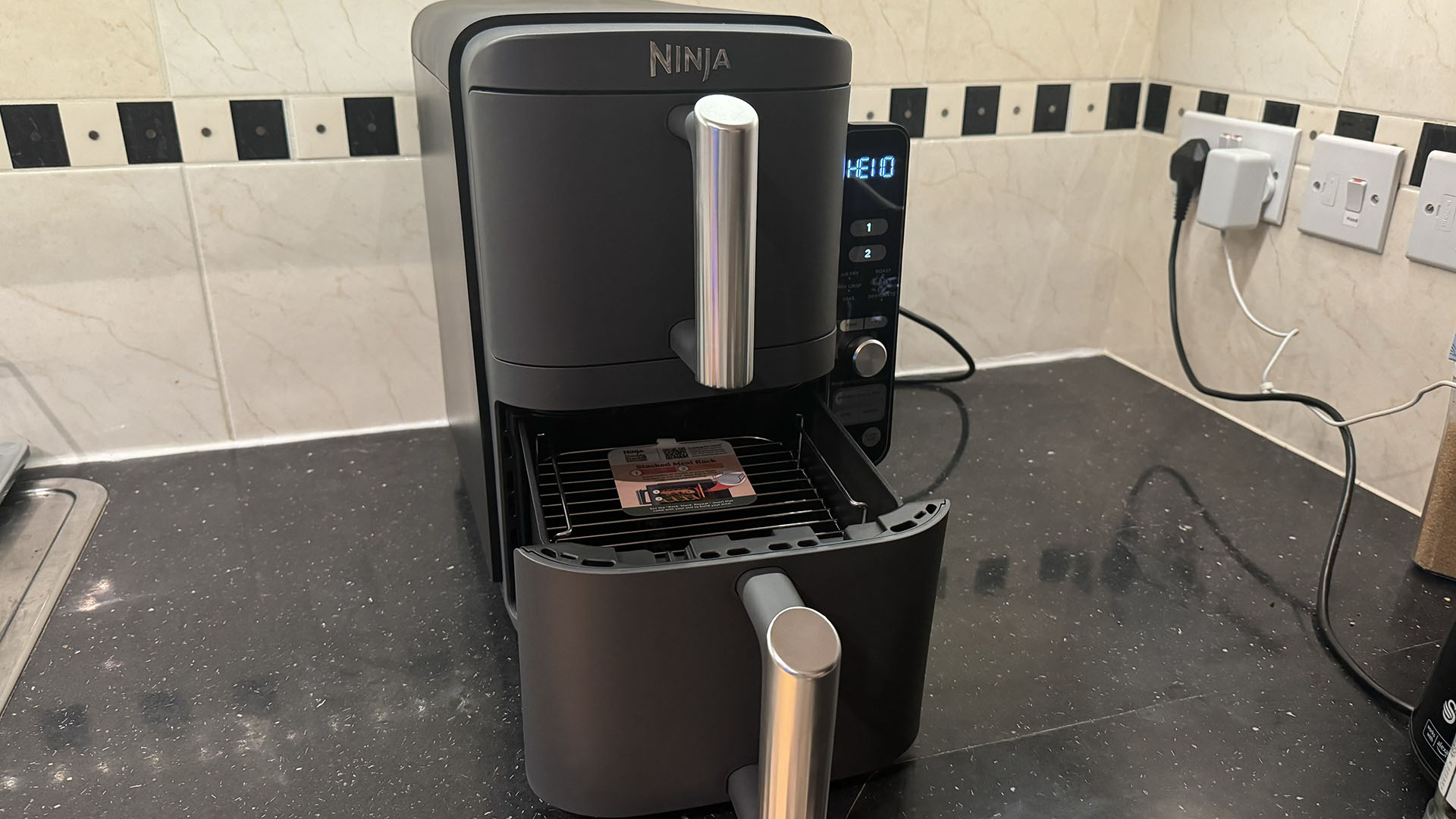
As the name suggests, the Ninja Double Stack air fryer stacks its two cooking drawers stop one another instead of side by side, as we tend to see in dual-basket air fryers. Instead of a top- or front-mounted dashboard, a small panel juts out to the right side of the device, hosting all the functions and controls you’ll need to operate the Double Stack. Plus, Ninja has even thrown in two extra racks, which can be slotted in above the main crisper plate, giving you bonus surface area to cook with – though the grill spacing makes these far better for larger food items.
Just like other products in the Ninja line, I saw great results from the Double Stack air fryer, from delicious fluffy fries to perfectly crispy chicken and succulent salmon. It should be no surprise, but I was concerned before trying the device that the cooking quality may have been compromised by the new design. Thankfully, there were no cooking compromises that I could detect. The only real down-side is the price, which is on the high side for a dual-basket air fryer – but for those who need to protect their previous counter space, it's well worth the extra cost. Here's my full review.
Ninja Double Stack air fryer review: price & availability
- List price: XL (8.3qt / 9.5L): $229.99 / £269.99 / AU TBC
- Availability: UK and US – Australia TBC
At time of writing, the Ninja Double Stack is available in the UK and US. In its XL 8.3qt / 9.5L capacity, it has a list price of $229.99 / £269.99. Availability and pricing in Australia is TBC. There should also be a standard, 6.7qt / 7.6L model to go alongside the XL model reviewed here, but since the devices were first announced earlier this year, we haven't heard anything about it.
The Double Stack XL is a fair bit more expensive than comparable double-drawer air fryers like the Instant Vortex 9-quart air fryer, which costs $199.95 / £199.99 / AU$399, but for the price difference, you get an as of writing one-of-a-kind device offering superior performance and maximum air frying potential.
It comes with two non-stick, dishwasher-safe drawers and crisper plates, two stainless steel racks and a recipe guide.
- Value for money score: 4.5 out of 5
Ninja Double Stack air fryer specs
Ninja Double Stack air fryer review: design
- Space-efficient design, with two drawers stacked vertically
- Side-mounted dashboard
- Two extra stainless steel racks doubles the cooking space
For anyone with a smaller kitchen or who prefers a more compact setup, the Ninja Double Stack is a revelation. It’s the first air fryer to stack two drawers vertically to optimize counter space, and the inclusion of its two stainless steel racks doubles the surface area available for cooking. The air fryer is available in one colorway; a sophisticated slate gray shell, with ridged silver handles. It’s simple and subtle, and I personally prefer that to the glossy black cladding many air fryers opt for.
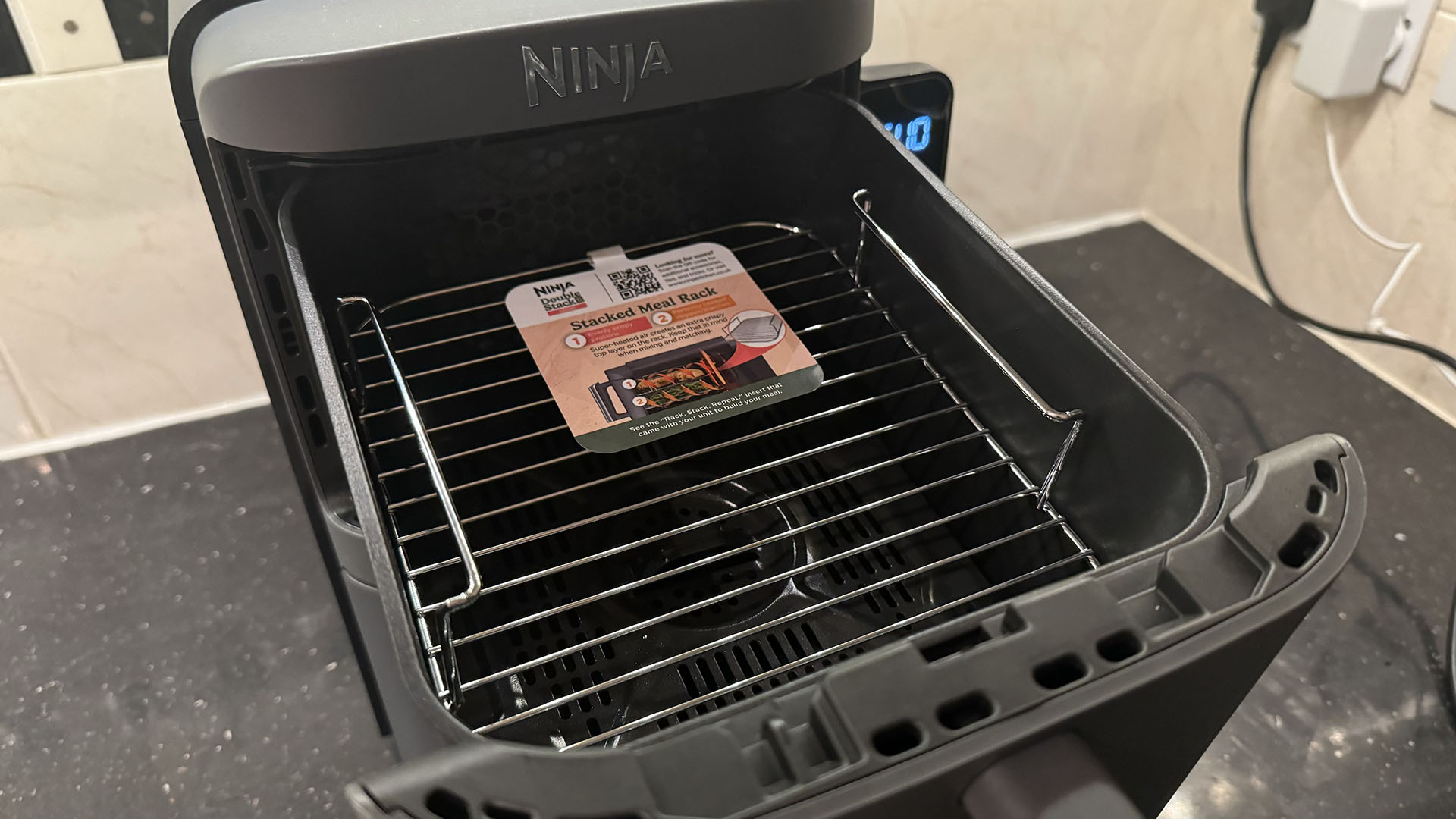
To account for those who might have lower-hanging cabinets, the controls for the Double Stack are mounted to the right of the air fryer, which does add 2in / 5cm to the overall width. However, it’s fairly unobtrusive, and unless you plan on having the right side of the air fryer flush to the wall shouldn’t pose a problem (reminder that you should be leaving at least 5 inches of space around an air fryer if you don’t want to make one of the biggest mistakes of air fryer cooking).
The side panel offers all the usual Ninja air fryer features. There’s a screen at the top which shows the timer for each drawer as well as the temperature setting. Beneath are numbered buttons to individually control each drawer, as well as a list of the six presets for air frying, roasting, max crisp, reheating, baking and dehydrating. Each setting has a light indicator next to it to show which mode is currently selected, and you can tweak the settings using the temperature and time buttons in tandem with the roller dial. Lastly, you’ll find the Double Stack Pro, Sync and Match buttons above the power and stop / start buttons.
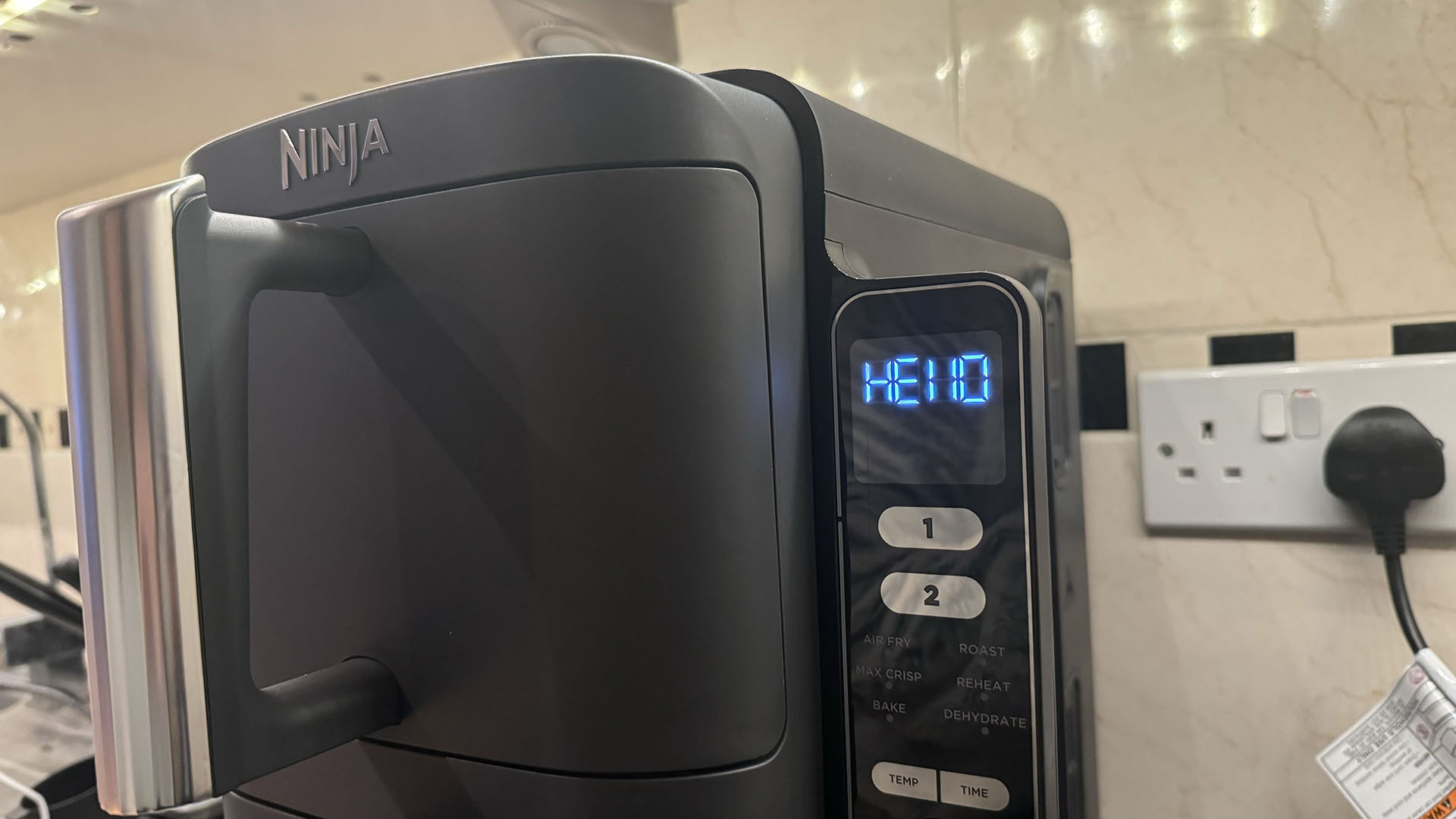
Its two dishwasher-friendly 5qt / 4.75L baskets have individual handles, so you can fully manage each drawer independently. However, if you’re using the two stainless steel trays on top of the base crisper plates, it might be a little more annoying to flip and adjust your food mid-cooking cycle. Ninja has made efforts to ease this slight drawback by adding handles to the trays, making them nice and easy to quickly remove.
It’s worth noting that the back of the baskets each have a grate with fairly large holes, so it’s not suitable for cooking high volumes of liquid – we recommend against cooking these kinds of dishes in an air fryer instead of one of the best instant pots, regardless, but some users do like to break convention. These holes also mean that if you shake particularly oily, batter-laden or otherwise messy foods, some liquid may splash behind the baskets onto the back of the air fryer. It’s a very small issue judging by my testing so far, so long as you keep on top of cleaning the Double Stack.
- Design score: 5 out of 5
Ninja Double Stack air fryer review: performance
- Same fantastic performance as other Ninja air fryers
- Perfectly crisp chicken wings and fluffy fries
- Time and effort-saving Sync and Match settings
Before I tested the Ninja Double Stack air fryer, I was a little dubious about how its performance would hold up against other Ninja models I’ve tested. Surely, there would be a compromise to vertically stacking the drawers, otherwise, it would have been done far sooner, right?
Thankfully that doesn’t seem to be the case with the Double Stack. Everything I cooked came out just as good as I’d expected, with perfectly crispy chicken wings without the need for a drop of oil, and gorgeous fluffy fries with the perfect amount of bite. There was a small degree of unevenness; fries towards the back of the basket cooked ever so slightly faster than the front, but it was to such a small degree I don’t think most users would notice.
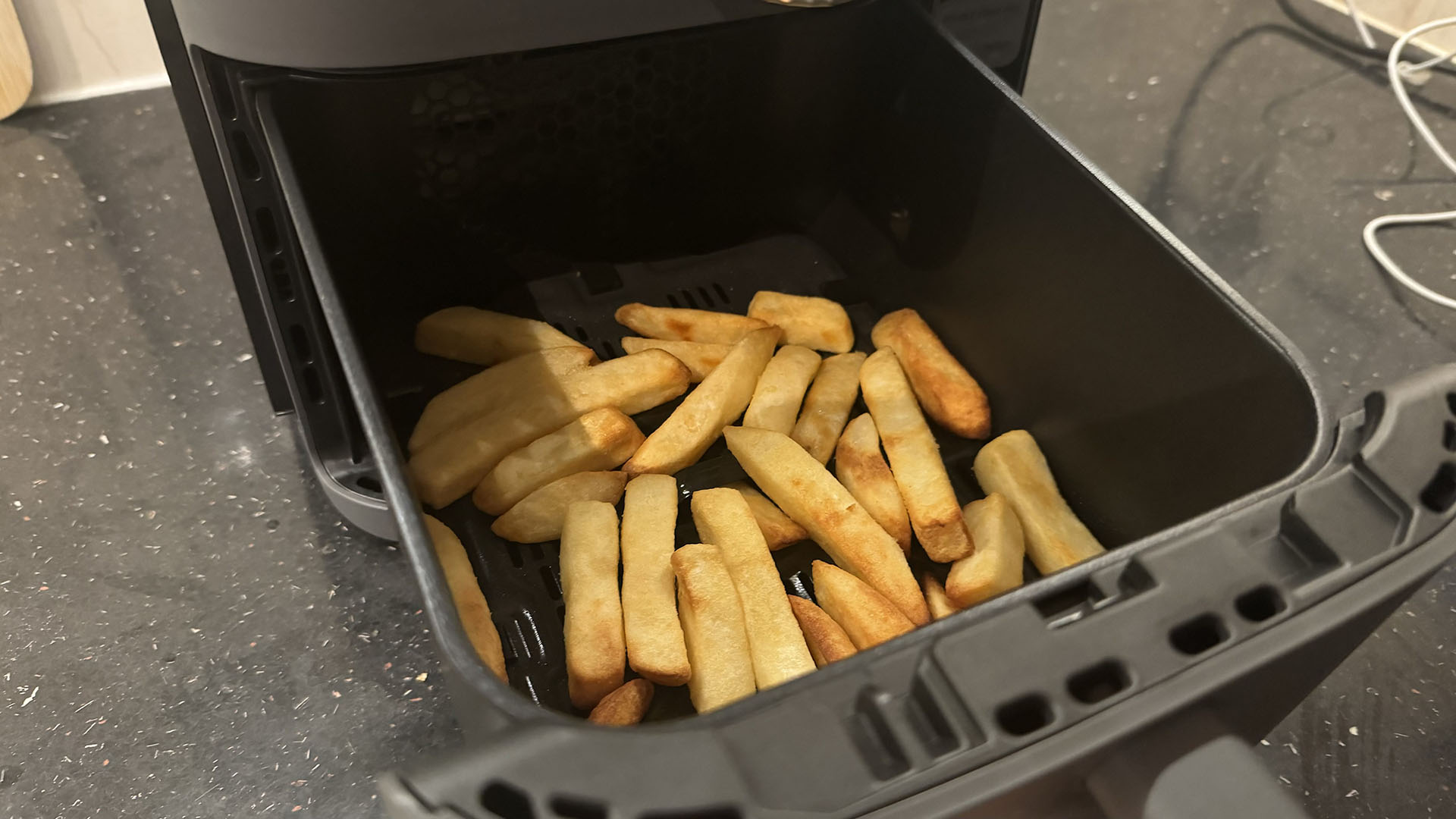
The Double Stack offers six cooking modes – Air Fry, Max Crisp, Roast, Bake, Dehydrate, and Reheat – all of which work just as well as in other Ninja air fryers. The different modes all have different temperature and time limits, but the Double Stack can reach temperatures of 450F / 240C and cook for up to an hour. It doesn’t require pre-heating, meaning you can get straight to cooking.
Food cooked on the stainless steel trays seems to fare just as well, though you do lose the benefit of the crisp trays’ surface area. For some foods, that’s a benefit; you don’t always want foods to cook via contact as well as convection, which was definitely the case for the chicken wings I cooked across both types of trays.
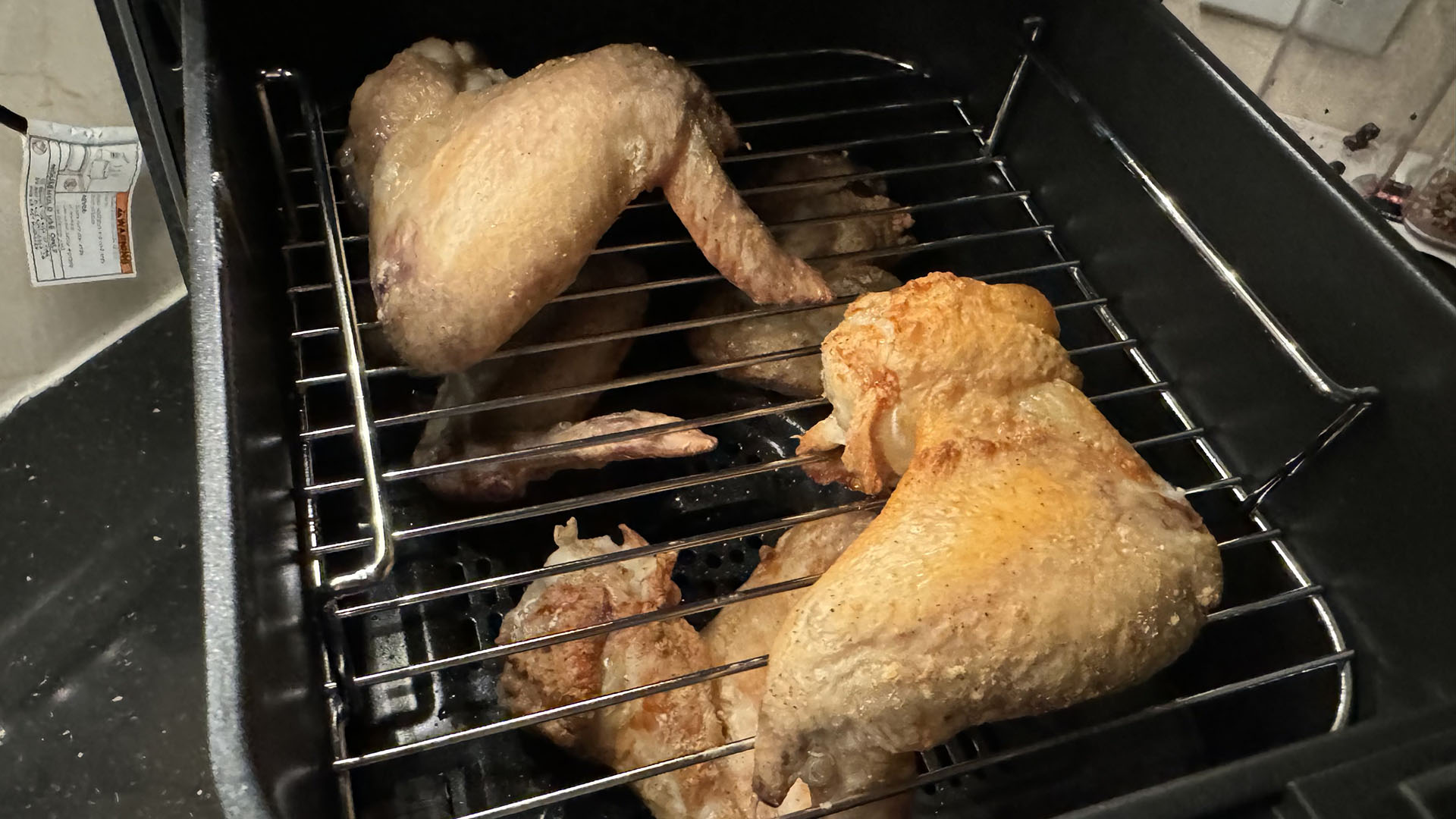
You’ll also have to think about the overall temperature setting of each basket and put foods with like-for-like cooking times and temperatures in each basket, or open up the trays to add in food later. This can be slightly annoying at times; I had to strategically plan how I cooked four tapas dishes to make sure I’d optimized both the strengths and weaknesses of both types of tray, as well as the cooking times and temperatures of each dish. It’d still opt for this rather than heating up a whole oven, though.
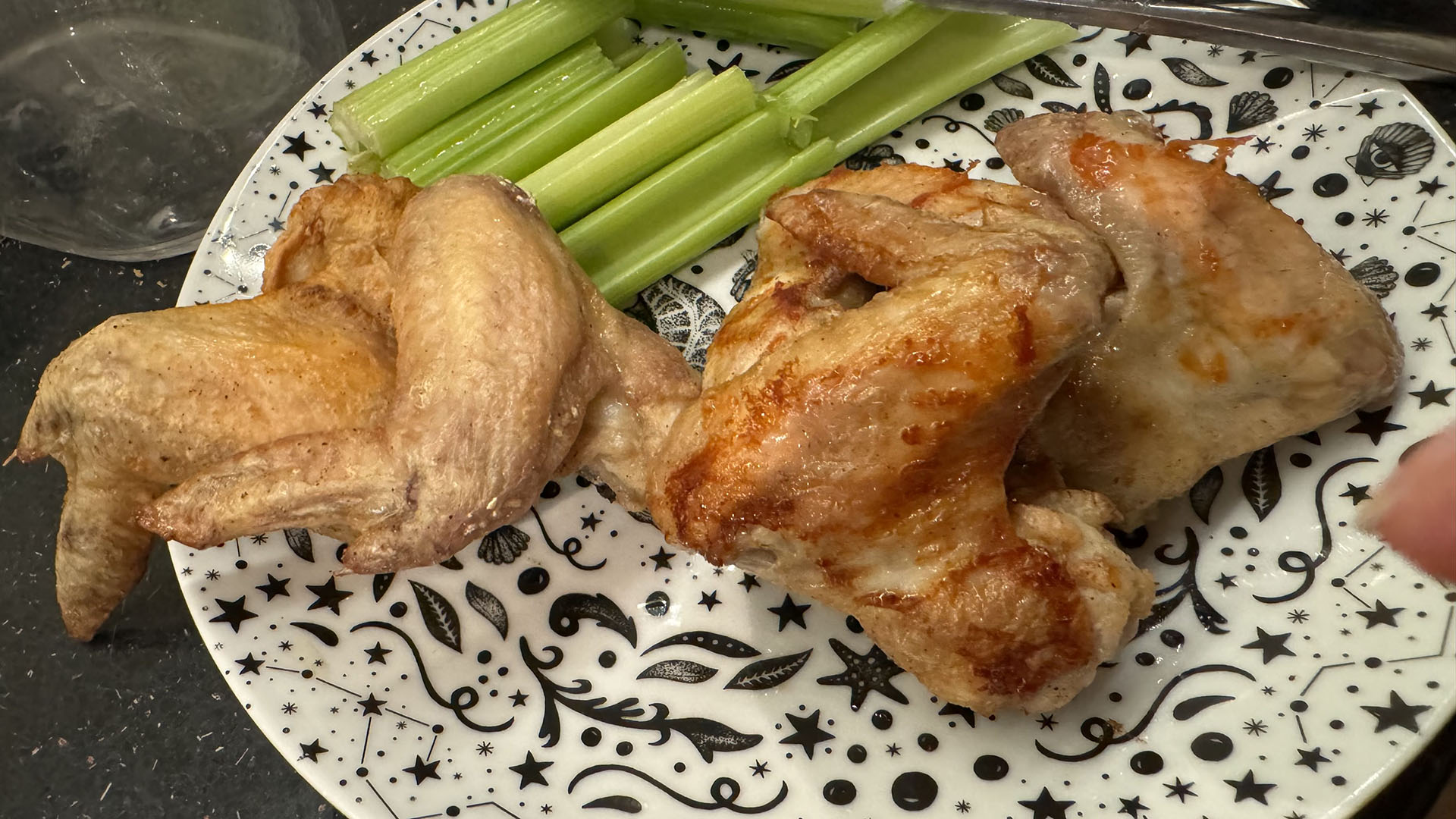
In case you’re new to the world of Ninja air fryers, it’s worth highlighting the Sync and Match cooking modes, which work to ensure your food all comes out at the same time. Simply select your cooking mode, set your time and, if you’re synchronizing the two baskets, select the cooking times for each, and you’re all set.
Unlike other dual-drawer models I’ve tested, including Ninja’s Instant Vortex 9-quart air fryer, there’s virtually no heat leakage between the two trays, which is excellent news if you’re working with very precise foods or just don’t want to waste energy by passively heating two areas when you only need one.
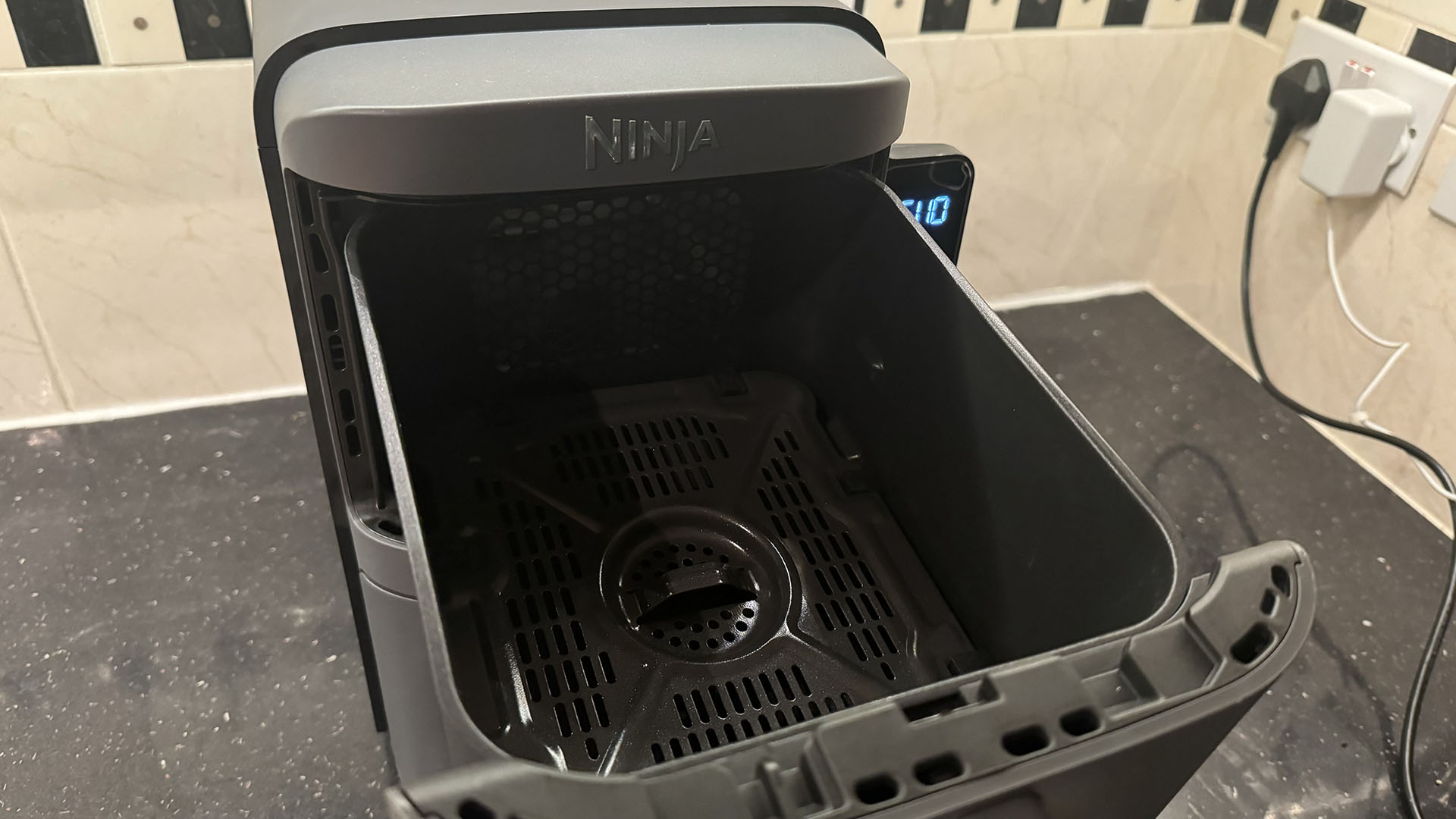
On the down-side, you can’t cook larger foods like pizzas or whole chickens in the Double Stack like you can in wider air fryers with larger cooking cavities. It’s the natural trade-off with its smaller footprint, and there are plenty of options that do cater to that need, if that's your priority. While Ninja claims the XL model I tested can feed eight people, I’d say that’s a little ambitious unless you’re padding out the meal with non-air fryer foods too.
- Performance score: 5 out of 5
Should I buy the Ninja Double Stack air fryer?
Buy it if...
Don't buy it if...
Ninja Double Stack air fryer: alternatives to consider
How I tested the Ninja Double Stack air fryer
- I used the Ninja Double Stack air fryer for two weeks
- I used it to cook all of my meals, including chicken wings, fries and salmon
- I also tested the different cooking functions
I used the Ninja Double Stack air fryer as my main countertop cooker for two weeks, using it to cook everything from fries to chicken wings, salmon and even cauliflower cheese. I evaluated how each food item cooked across all four trays, using different settings to see how well each function performed. I assessed how succulent meat and fish were after cooking against how well the outside crisped, as well as the evenness of the browning, and how well fries managed to retain their internal fluffiness while still achieving crispy skin.
In addition to the cooking, I evaluated how easy maintenance was; is it easy to clean the baskets and trays both with and without a dishwasher, are there any extra considerations for cleaning, and how easy is the device to actually operate.
I’ve been testing air fryers for two years, and in that time I’ve tried everything from premium to affordable, single-serve to full family models. This experience combined with my love of food and cooking help to inform my findings in every review.
0 comments:
Post a Comment